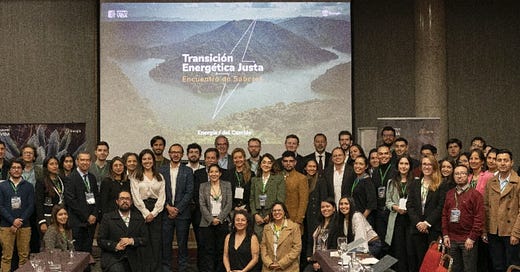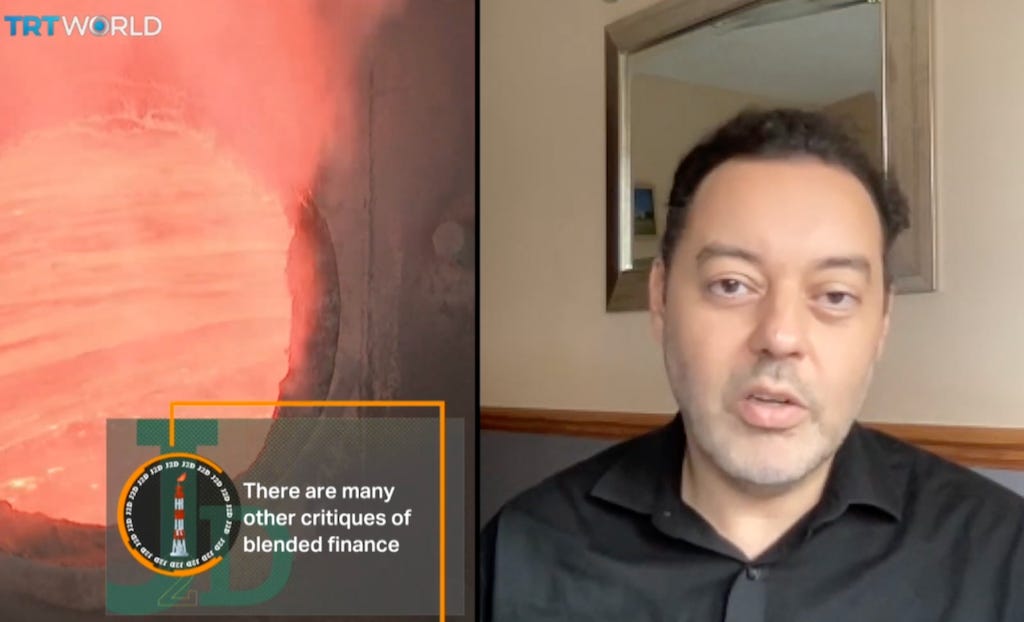Greetings from Bogota,
I spent the week in Bogota, Colombia for a series of presentations and meetings with Colombian government senior officials in the ministry of finance, the ministry of mines and energy, as well as senior diplomats. I also had a chance to meet with several academics, think tanks, and civil society organizations. It’s been a very productive and inspiring week. Today I wanted to comment briefly on the EU-Egypt “partnership” and on the Copenhagen Climate Ministerial meeting, which will set the stage for COP29, now dubbed the Climate Finance COP. Will it deliver? Or will it be the COP where climate finance goes to die?
The EU strikes again!
My colleague Peo Hansen wrote this very important blog recently to remind us that the very foundation of the European Union was a colonial project. I have written about why Africa must reject the Mattei Plan for Africa, but these EU plans for Africa never stop. The latest one is the so-called strategic and comprehensive partnership between the EU and Egypt. Desperate for cash and under severe economic and social pressure domestically, the Egyptian government is once again walking into an EU-sponsored debt trap that is somehow labeled "strategic partnership".
It is certainly strategic for the EU to Arab-wash its complicity in the Gaza genocide by pushing through the export of stolen gas from occupied Palestine via Egyptian LNG plants, all for the sake of the EU's energy security. Allow me to quote my dear colleague Sultan Barakat’s recent op-ed on this subject:
This is a painful reminder of the failed EU energy security policies, which continue to be anti-climate, extractive, and colonial deals drenched in Palestinian, African, and Latin American blood.
Almost the entire $8 billion "aid" package is in the form of loans, European private sector investments; de-risked, of course, to ensure profitability to foreign investors, and greenwashed extractive investments. The grants portion of the deal is designed for Egypt to police EU-bound migration at the source.
This is a classic EU bilateral strategy of economic entrapment designed to keep African countries locked at the bottom of the global value chain, drained of their natural resources at the lowest possible cost, and policed by their own governments in a system of neocolonial abuse under the guise of "strategic partnership".
COP29: Where Climate Finance Goes to Die?
I was asked to comment on this week’s annual Copenhagen Climate Ministerial meeting, which brings together 40 climate leaders and ministers to set the agenda for the next COP. Here is my take on it in a few sentences.
The state of climate finance today is disturbingly absurd. Global North countries owe a climate debt to the Global South, but instead of offering transformative climate finance in the form of debt relief, grants and transfer of life-saving technology for climate adaptation, they offer market-based greenwashed colonial entrapment in the form of loans, pollution permits (a.k.a. carbon credits), and de-risked extractive investments. If the Copenhagen Climate Ministerial meeting doesn't reset the climate finance rules of engagement this week, I am afraid we are going to COP29 with the expectation of more distractions, false solutions and tranquilizing drugs of gradualism and incrementalism. Will COP29 be the place where climate finance goes to die? or will it be the place where real climate action finally begins? We’ll see. You can read my take on how things went at COP28 here and here, and on the most dangerous climate finance “solutions” here.
Climate Reparations, not climate finance!
From a Global South perspective, climate finance ought to be a climate debt issue. The Global North has exceeded its carbon budget by appropriating and colonizing the atmospheric commons, which means the Global North owes a climate debt to the Global South. According to a recent study by Fanning and Hickel (2023), climate debt is estimated to be $193 trillion! Compare that to the $700 millions pledged to the Loss and Damage Fund!
So when someone owes a $100 debt, they are supposed to pay $100. However, in today’s climate finance framework, that person will give you $3 (disbursed in 12 installments) and will dictate what you can do with your $3 (requiring KPIs, transparency, accountability and quarterly reporting; otherwise disbursement is halted). Next, they will offer you a $7 loan at a concessional interest rate (noblesse oblige) but also with conditionalities dictating your spending and investment choices. Then, they will give you $5 but only if you give them your forest (carbon credits). Next, they will invest $10 in water-intensive green hydrogen projects for their own use. And finally they will also invest another $12 in obsolete assembly line manufacturing by low-cost labor to be exported to their consumer markets, but only if you de-risk it and blend-finance it to guarantee their profits.
All of this camouflaged extraction is happening when you are supposed to simply receive the $100 of climate debt owed to you without having to give anything in exchange. This is what climate finance looks like today. It’s greenwashed neocolonial extraction and abuse dressed up in market-based climate finance solutions.
Climate finance ought to be climate reparations in the form of debt cancellation, cash transfers, and transfer of life-saving technology for transformative investments in food sovereignty and agroecology, renewable energy, clean cooking, and clean transportation infrastructure manufactured and deployed in Africa. I tried to reset the climate finance conversation in this recent interview on TRT World about the so-called “blended finance”. I explain why the EU and Germany’s investments in Namibia’s green industrialization is in fact economic entrapment, green colonialism, decarbonization by dispossession for Namibia, in addition to it being an economic trade weapon for Germany against its global competitors, and an inflation management tool for the EU thanks to the CBAM tax. Take a listen.
I will write more about Namibia and green industrialization soon.
That’s it for today!
Gracias!
Fadhel Kaboub is an associate professor of economics at Denison University (on leave), and the president of the Global Institute for Sustainable Prosperity. He is also a member of the Independent Expert Group on Just Transition and Development, and serves as senior advisor with Power Shift Africa. He has recently served as Under-Secretary-General for Financing for Development at the Organisation of Southern Cooperation in Addis Ababa, Ethiopia. Dr. Kaboub is an expert on designing public policies to enhance monetary and economic sovereignty in the Global South, build resilience, and promote equitable and sustainable prosperity. His recent work focuses on Just Transition, Climate Finance, and transforming the global trade, finance, and investment architecture. His most recent co-authored publication is Just Transition: A Climate, Energy, and Development Vision for Africa (May 2023, published by the Independent Expert Group on Just Transition and Development). He has held a number of research affiliations with the Levy Economics Institute (NY), the John F. Kennedy School of Government at Harvard University (MA), the Economic Research Forum (Cairo), Power Shift Africa (Nairobi), and the Center for Strategic Studies on the Maghreb (Tunis). He is currently based in Nairobi, Kenya and is working on climate finance and development policies in Africa. You can follow him on Twitter @FadhelKaboub and you can read his Global South Perspectives on substack where he blogs regularly.










